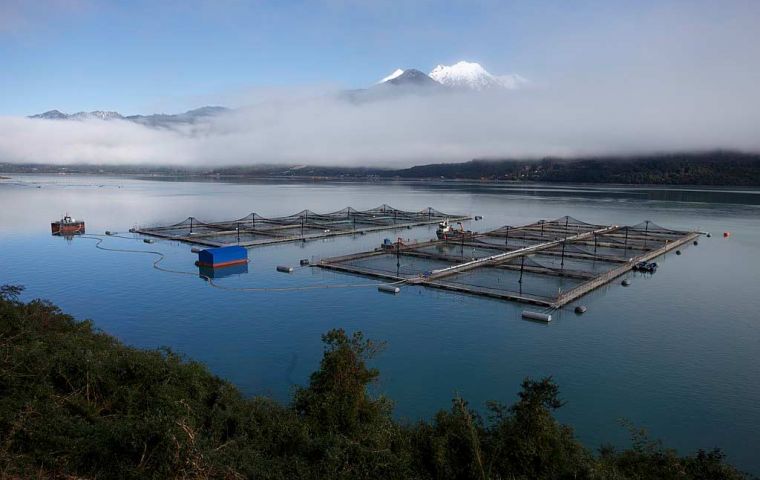MercoPress. South Atlantic News Agency
Salmon farming industry fights back in Magallanes despite president Boric's intended policy
 The president Boric administration has anticipated a moving out of the salmon industry from Magallanes Region
The president Boric administration has anticipated a moving out of the salmon industry from Magallanes Region “Salmon farming industries must move out of protected areas” was the controversial phrase from Chilean president Gabriel Boric during his latest visit to Magallanes region, the extreme south of the country.
The statement had its impact not only in Chilean regions fully dedicated to salmon farming, but also because Boric, grew up in Punta Arenas, capital of Magallanes, where his father was a staff member of ENAP, Chile's oil company.
“Policy stands, no changes, only minor shades”, admitted the Deputy Environment minister Maximiliano Proanios following a meeting with salmon industry companies, adding that “the exit of salmon farming companies from the region will be gradual and planned, not suddenly overnight”.
But the industry was quick in responding. The president of the Magallanes Salmon industries, Carlos Odebret, made a public statement on the facts of the industry and their economic meaning for several Chilean regions. “The industry is undergoing a consolidation process, last year in the Magallanes region some 140,000 tons of salmon were harvested and this year we estimate a higher volume; which means full time direct employment for four thousand families, from Punta Arenas, Puerto Natales and Porvernir”.
Odebret added that salmon farming activity has become a strong reference for the regional economy and nowadays represents 40% of total exports for Magallanes, and together with fisheries they account for 26% of the region's GDP, “that it the fourth component of Magallanes economic activity”.
Since 2015, the industry has not ceased to grow and has consolidated, with relevant investments, for example at the Entrevientos, Punta Arenas processing plant; Australis is planning a plant in Puerto Natales, and there is an Environmental Qualification Resolution approved for a plant that is planned to help dispose the problem of the industry's waste, basically turning viscera into oil.
Odebret was asked if he was not surprised that among the thirty associates of the newly formed Magallanes Corporation, it had not included the salmon industry. He replied that “the decision belonged to the Region's governor Jorge Flies, and it's up to him who's in and who's out from that corporation, as to us we are always open to dialogue and we consider ourselves part of the region and with time, I'm sure we will be contributing in the same direction”.
Asked about recent sanctions and fines imposed on Nova Austral by the Environment secretariat which rejected three requests for breeding farms, Odebret replied that even when Nova Austral is not a member of the association of which he is president, “the company committed extremely serious environmental offences and a sanctions procedure has been initiated, which has consequences and sanctions and evidently the company will have arguments to defend what happened”.



Top Comments
Disclaimer & comment rulesCommenting for this story is now closed.
If you have a Facebook account, become a fan and comment on our Facebook Page!